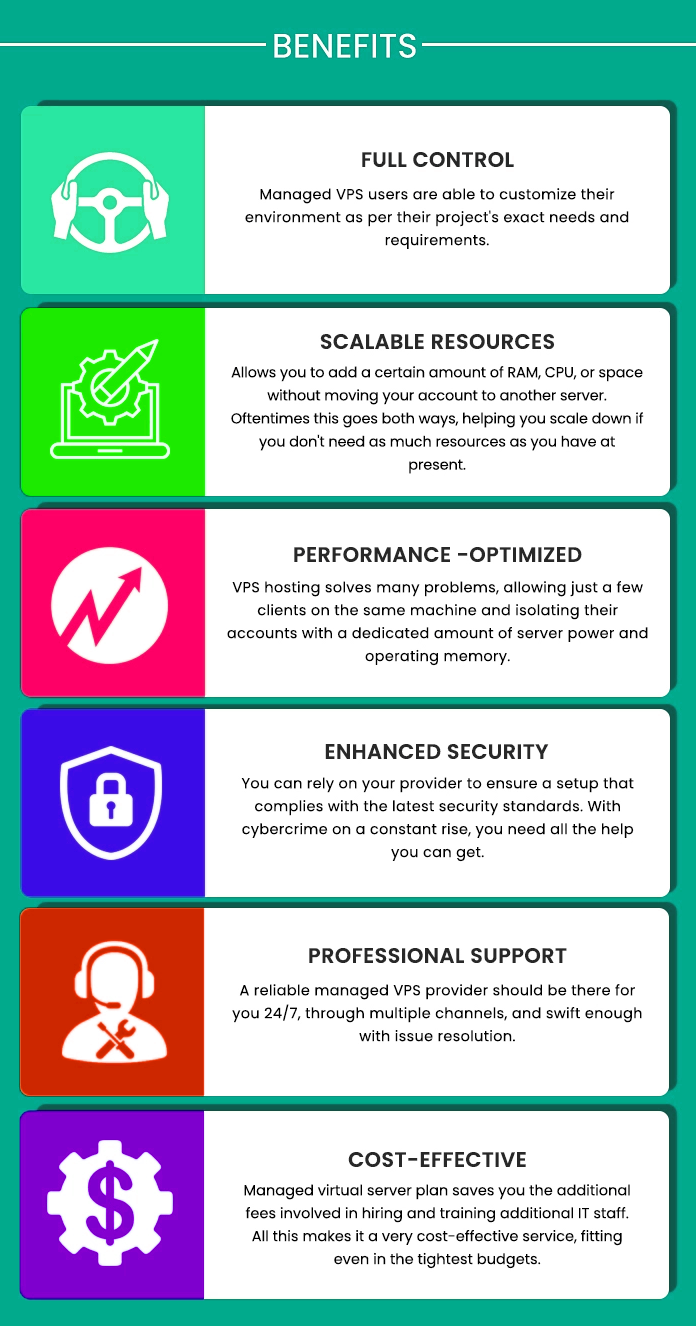
A virtual private server (VPS) is a hosting solution that falls between between shared hosting and dedicated hosting. You can host a popular website or a collection of websites on a slice of a dedicated virtual server.
At an accessible price point, the finest VPS hosting services offer both managed and unmanaged plans. Additionally, they should have ample storage, RAM, and data transfer capabilities. We examined the fundamentals of a web hosting company, such as pricing, resources, and customer service, as well as VPS-specific features, in order to present you with our top suggestions to choose the right VPS Hosting.
Types of VPS Hosting
You may have seen different VPS product terms during your research:
- Cloud VPS
- Cloud Server
- Managed VPS
- Self-managed VPS
- Unmanaged VPS
- High-Availability VPS
The Advantages of VPS Hosting
For many users, the primary benefit of a VPS is that it provides many of the same features as a dedicated server at a fraction of the cost. Additionally, it provides greater reliability than a shared server, as you are not required to share resources with other businesses who are located on the same server.
However, it also provides you with increased versatility due to the fact that they may be customized far more. With a shared server, the web hosting company manages the websites, and you have input but little actual control. You can have as little or as much control as you like with a VPS.

While conducting business online necessitates the development of a good website, companies usually underestimate the critical role of the Web hosting. The Web hosting on which your website is hosted is just as critical as the design and functionality of your website. Therefore, how do you choose a right VPS hosting and do you require anything more than a host?
Consult a Developer
I propose that you review the details and functionality of your website before deciding on a hosting service. Understanding how your website will be constructed and the level of support provided by your development firm will assist you in deciding on a hosting provider. If you already have a website, examine traffic and bandwidth requirements with your developer to determine what additional resources you may require for growth. Once you’re familiar with the framework that will be utilized to build or expand your website, you can begin researching the organizations advised by your developer as well as any hosts you may already have in mind. You may need to upgrade from a shared hosting provider, which brings us to an introspective look.
Look at Your Business Requirements
How much assistance do you believe you’ll require from your web hosting company? If you’re developing the website yourself or employing a temporary contractor, you may want to consider a host that offers additional service assistance. Each hosting provider has a support department, however their definition of support may differ from yours. If you’re a sole proprietor, you may require the assistance of a service that specializes in application installation. This is a task that is frequently undertaken by third-party developers, but some hosting companies offer this degree of support for a fee.
While most hosting companies promote website uptime, what about backups? Backups are required not only when a site goes down, but also when an error is made. I’m at a loss for words as to how many folks have unintentionally renamed or overwritten a file and required the restoration of a backup. How responsive is your host to your needs? Response time has a significant impact on any organization, which is something to keep in mind while evaluating your host. However, response time and resolution time are two distinct concepts. Make certain to investigate both. Avoid being swayed by marketing messages; instead, have an understanding of how businesses escalate tickets and resolve issues.
How many websites do you have?
It is not commonplace to have multiple websites for marketing purposes. If you have multiple websites, do you prefer a dedicated hosting account for each or a VPS? VPS Hosting can be an excellent alternative for managing several websites, as they provide you or your developer with a root-level connection to handle Web service installation. Additionally, VPS settings enable a hybrid of shared and dedicated applications, as well as a varying amount of support and resources, depending on the provider.
The location of your website is critical for both supporting you as a business owner and providing a speedy experience for your customers. Ensure that you select a high-quality solution that meets both requirements.
Final Words
Root access, cost, and bandwidth availability are the most important deciding criteria. Managed or cloud VPS hosting is for you if you require root access and dedicated bandwidth at a low cost.
A VPS could be the ideal choice if the majority of your business is done online and your traffic is expanding. VPS hosting from HostWorld is simple, quick, and reliable, providing you and your business with the power and performance you need.












One Comment